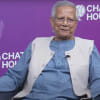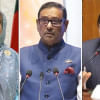Our expectations of this government should match its competence

However lacklustre the interim government might seem today, it is still the best government one could have hoped for in August. Amid the chaos, an administration was cobbled together and appointments made with only such care and political acumen as an academic and his confidantes could muster under pressure.
Prof Muhammad Yunus was, of course, the right person at the right moment. He brought huge symbolic power, and, more importantly for a mandate, he enjoyed the respect of the student movement that had led the revolution, suffered for it, and had thereby come to define the nation's moral compass. But, even as we fully supported Yunus's leadership, older observers no doubt recalled the professor's abortive attempt 17 years ago to start a party. The hope this time around was that an older and wiser Yunus would enlist enough talent to make up for any shortfall in capability and vision.
The availability and conscription of talent has been an issue. In the first few months, a number of senior appointments were made only for the appointee to withdraw their name within days. And there has been a failure to recruit people with requisite skills into poorly paid government and agency roles relating to finance and economics, such as at the Bangladesh Securities and Exchange Commission.
Moreover, if diaspora associations of Bangladeshis are to be believed, the interim government has failed to avail itself of the country's brain drain of talented Bangladeshis who left for American universities and then went on to develop skills in demanding professional roles abroad, but who, apparently, stood ready to return and provide their services pro bono publico. But quality was never the priority in exigent circumstances. This was and remains an emergency government.
If we grasp that our expectations were unrealistic, a decline in our expectations of the interim government need not entail a sense of disappointment. In a recent interview with the editor of this daily, the chief adviser issued a corrective, again, when he said, "We are not rulers but facilitators." This is hardly the revolutionary rhetoric of radical reform; our expectations should correspond accordingly.
What expectations, then, should we have? Told repeatedly to vest hope in various commissions, we might have looked to their terms of reference. But, despite promises, terms were never published, and it now appears none of the commissions received any.
Mercifully, if promises are kept, we are only two or so weeks from recommendations from key commissions. But, again, we should temper expectations: in the same aforementioned interview, the chief adviser emphasised that recommendations would be acted on if and only so far as consensus among political parties allowed. In recent comments, he added that another commission would be formed, this time to build such consensus. And, in a dramatic turn, he indicated that elections might come as early as the end of 2025, which immediately had many wondering whether anything more than anaemic reforms could achieve sufficient political consensus to be pushed through in under a year.
Change will take time and will require competences yet to come. We can look forward to the imminent recommendations of commissions, we can even hope for great things in the years ahead, but we should temper our expectations of the administration before us now. Unless we shift our horizons and look to the longer term for transformation, the risk of disappointment will loom large. Such disappointment is the breeding ground for the authoritarianism that has swept over so much of the world. Bangladeshis already know what authoritarianism looks like. No one keen to see the nation flourish would want its return.
No sooner had the chief adviser mentioned the prospect of a short timetable than leaders of the Jatiyatabadi Chhatra Dal, the Anti-Discrimination Students' Movement, and the Bangladesh Students' Union all demanded that key reforms be completed before holding elections.
It is increasingly apparent that the student movement could emerge next year as the interim government's greatest critics. Driven by a sense of justice, not least to honour the sacrifices of their peers, will students abide anything less than radical reforms? Adviser Nahid Islam, for instance, has scarcely been shy with talk of banning political parties and punishing journalists deemed to have aided the former regime. His public remarks have often been hastily followed by other advisers' efforts to roll back what he said.
The dynamic between the interim government and the student movement may yet decide the former's fate. To some, a full-throated launch of a new student political party might seem slow in coming, but, in fact, both the student movement and the government may regard it as in their respective interests to delay such launch. For one thing, the movement would lose its authority as the nation's independent moral compass above the party fray. For another, since this authority brought Prof Yunus on stage, a fully fledged student political party would deprive the interim government of some of its moral patronage, mandate, and advisers. The prospect is not fanciful of the student movement taking to the streets again, later in the year, this time to demand an ambitious reform programme. It's not even too much of a stretch to imagine the interim government privately welcoming this as a means to overcome institutional sclerosis and break through political resistances to the substantial reform it might wish to carry through.
There are also global reasons to manage our expectations of the interim government. If Bangladesh aspires to have liberal democracy—meaning, broadly speaking, democratic pluralism with the rule of law and protections for the rights of minorities—it will be swimming against the global current. These days, the US, France, Germany, and a host of other countries (such as South Korea) are hardly resounding advertisements for liberal democracy. Liberal democracy is losing or loosening its moorings, in countries where one might once have naively thought a version of liberal democracy had achieved permanence, marking an end to a history of grand, ideological struggles.
The theme throughout is the failure of a global economic order to deliver to most citizens; the majority in the US, the UK, France and elsewhere have seen no real growth in household incomes in decades—in the case of the US, for well over three decades. In a climate of economic insecurity and disappointment, right-wing demagogues have marched in with little more to offer than a pretence of upsetting the applecart.
I mention all this because speaking to the business community has concentrated my attention on economic missteps, as has recognising that it's rare—some would say unheard of—for a country to secure liberal democracy without first finding a firm economic foundation. I can't think of any.
Since August, there have been too many economic errors and missed opportunities. One of the world's leading venture capital operations visited Bangladesh to discuss investment in the country. They were not taken seriously, I'm informed, by that tired old Dhaka elite we're all familiar with, an elite that stands to lose some privileges when or if Bangladesh enters the next phase of economic development, a phase in which, among other things, investment capital must be better able to reach the best and the brightest, and, incidentally, stem the drain of talent.
I reflect more and more on what brought us here in the first place. Against a backdrop of massive and rising youth unemployment and an economy stalling for two years after a long period of growth, students took to the streets protesting a quota system that blocked one of the few routes to a measure of personal economic security.
Change will take time and will require competences yet to come. We can look forward to the imminent recommendations of commissions, we can even hope for great things in the years ahead, but we should temper our expectations of the administration before us now. Unless we shift our horizons and look to the longer term for transformation, the risk of disappointment will loom large. Such disappointment is the breeding ground for the authoritarianism that has swept over so much of the world. Bangladeshis already know what authoritarianism looks like. No one keen to see the nation flourish would want its return.
Zia Haider Rahman, a former international human rights lawyer and head of research at Transparency International Bangladesh (TIB), is the author of the novel 'In the Light of What We Know.' His Facebook handle is @ZiaHaiderRahmanBD.
Views expressed in this article are the author's own.
Follow The Daily Star Opinion on Facebook for the latest opinions, commentaries and analyses by experts and professionals. To contribute your article or letter to The Daily Star Opinion, see our guidelines for submission.

 For all latest news, follow The Daily Star's Google News channel.
For all latest news, follow The Daily Star's Google News channel. 











Comments